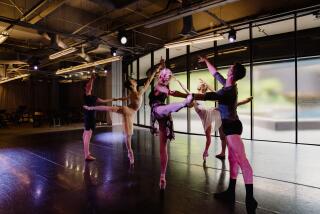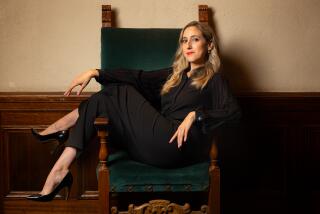Bringing a legend to life
- Share via
Fame, forbidden love, madness and a mythic immortality: Vaslav Nijinsky experienced them all in a brief career as the first male superstar of 20th century ballet -- and a much longer period as a living symbol of the destruction of the artist at the height of his powers.
Even before his death, his story was heterosexualized into the groundbreaking ballet film “The Red Shoes,” and it is now summarized and interpreted with great skill and daring in John Neumeier’s two-act dance drama “Nijinsky” for the Hamburg Ballet.
At the work’s American premiere, Wednesday at the Orange County Performing Arts Center, it offered the varied, moving, darkly triumphant performance of Jiri Bubenicek in the heroic title role.
But Neumeier deliberately breaks so many rules of dance storytelling that most of all his ballet seems a tribute to Nijinsky as choreographic pathfinder or perhaps an attempt to suggest the autobiographical memoir that Nijinsky himself might have staged -- in his mind, at least -- during his final years.
Neumeier understands that Nijinsky’s roles have a life of their own -- that, by themselves, the signature poses of Petrushka, the Faun, the Specter of the Rose and the Golden Slave in “Sheherazade” evoke the ballets they belong to and the mystery of the man who first danced them. So throughout “Nijinsky,” Bubenicek interacted with these and other stage personas in a narrative blending documentary realism with stream-of-consciousness Expressionism.
Beginning with Nijinsky’s last dance in 1919, the story sometimes narrows to biographical specifics -- such as the context for a famous backstage photograph -- but it also widens to stage-sweeping depictions of fascism and the glory of Sergei Diaghilev’s Ballets Russes.
As the action shoots through Nijinsky’s subconscious -- from, say, a madhouse ensemble dominated by a desperate Petrushka back to the tumultuous premiere of Nijinsky’s “Rite of Spring” -- you might well long for supertitles or those explanatory headsets that you can rent at museums. But the propulsive momentum of the choreography never falters, and the first-act finale in particular achieves a multilayered symphonic grandeur that takes the narrative into another dimension.
Neumeier set Act 1 mostly to perfumed Rimsky-Korsakov, Act 2 to pithy Shostakovich (unfortunately all on tape in Costa Mesa). Each half features extended duets highlighting Nijinsky’s relationships -- with his possessive lover, Diaghilev (Ivan Urban); his weak, adoring wife, Romola (Anna Polikarpova); his ambitious choreographer-sister (Elizabeth Loscavio); and his violently disturbed brother (Yukichi Hattori).
On Wednesday, these secondary roles inevitably proved simpler, less marbled than Bubenicek’s, but Polikarpova achieved a touching vulnerability as she fell apart, rather like Ophelia in Neumeier’s “Amleth,” when Nijinsky’s mental illness reduced him to a dangerous burden. Moreover, Hattori’s crazed convulsions provided one extreme in the whole spectrum of dementia that eventually dominates “Nijinsky.” However insane Bubenicek’s character may have been, his derangement seemed minuscule compared with the insanity of the world wars surging around him.
Neumeier’s concept for the costumes emphasizes the homoeroticism of many Nijinsky roles and the whole Ballets Russes mind-set. In particular, Alexandre Riabko and Otto Bubenicek (Jiri’s brother) embodied this emphasis superbly. Among the women, Loscavio and Heather Jurgensen proved adept at defining the facets and contrasts of Ballets Russes womanhood quickly and definitively.
Indeed, the Hamburg Ballet teems with distinctive dancers who can look antique and contemporary, ethereal and sensual, gay and straight in multiple roles or -- as with Lloyd Riggins as Petrushka -- turn a cameo into a special event.
In most other companies, the overwhelming sweetness, fire, technical precision and menace that Bubenicek commands would leave other dancers in the dust. But here, in a community of such accomplished, passionate, thinking Hamburg artists, he’s simply the biggest news in an evening full of discoveries.
*
Hamburg Ballet
Where: Orange County Performing Arts Center, 600 Town Center Drive, Costa Mesa
When: Today, 8 p.m.; Saturday, 2 and 8 p.m.; Sunday, 2 p.m.
Price: $20 to $75
Contact: (714) 740-7878
More to Read
The biggest entertainment stories
Get our big stories about Hollywood, film, television, music, arts, culture and more right in your inbox as soon as they publish.
You may occasionally receive promotional content from the Los Angeles Times.










